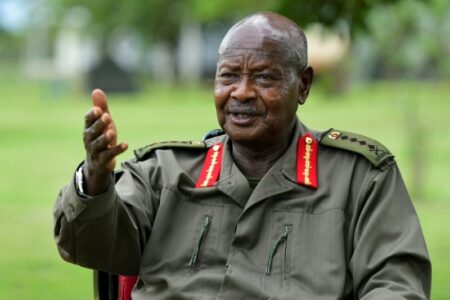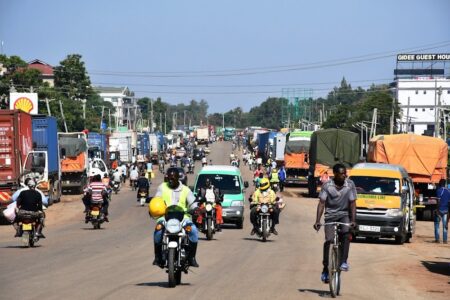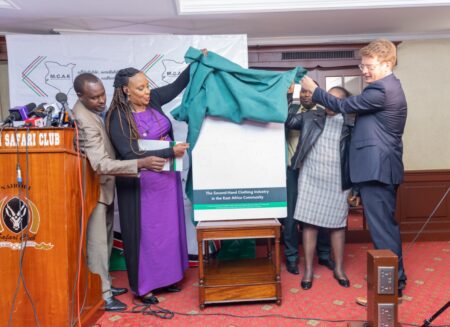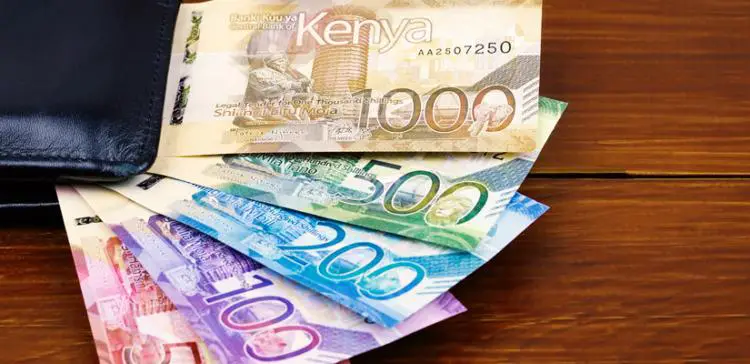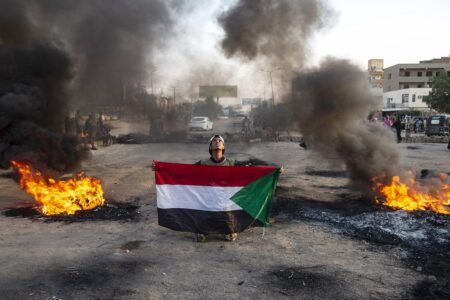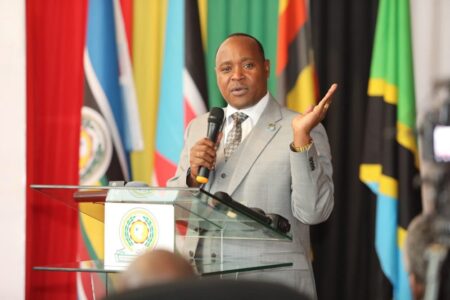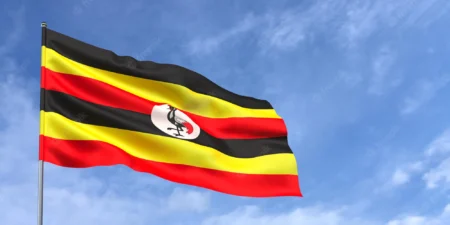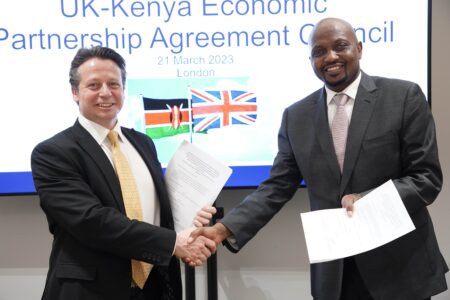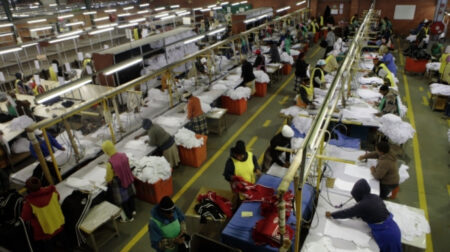- Africa’s new dawn: the rising role of digital and AI in agriculture
- Can Dangote Refinery Transform Africa Energy Ambition
- Gallup Survey: 80 per cent of Kenyan Workers Are Disengaged and Seek New Opportunities
- Madagascar Man Freed from 5KG Tumor After 15-Year Struggle
- How women in Africa are perceived and treated
- Sugar consumption in Kenya to Increase to 1.23 Million Tonnes
- Can Somalia and Turkey Oil deal Bring Change in Somaliland
- Remittances to Kenya dropped to $371.6 million in June, marking a six month low
Browsing: EAC
On the 1st of June 2023, African ministers for trade and industries adopted a protocol that prevents trading second-hand clothes across the continent under the preferences of the AfCFTA. This was during the high-level African Union – East African Community and the private sector forum, the second Ministerial Retreat of the Council of Ministers on the AfCFTA, held in Nairobi, Kenya, to assess the progress and address critical aspects of the agreement’s implementation.…
- AfDB projects mid-term economic growth across EAC will accelerate to 5.1% in 2023 and 5.8% in 2024. This will be the highest growth area in Africa.
- The region will largely be powered by growth in Rwanda, Uganda, Ethiopia, Kenya, Djibouti, and Tanzania.
- East Africa’s real GDP is riding on a strong services sector that contributed almost 50% of the economic growth in 2022.
According to the newly released African Development Bank economic outlook, the East African Community (EAC) economies will post the highest regional economic performance on the continent in 2023 and 2024, with growth rates of over 5 percent.
AfDB’s 2023 East Africa Economic Outlook projects that EAC’s mid-term economic growth will accelerate to 5.1 per cent in 2023. The region will further post 5.8 per cent economic expansion in 2024, outpacing all other African regions. The region will largely be powered by growth in Rwanda, Uganda, Ethiopia, Kenya, …
A recent report has revealed that the ban on second-hand clothing, also known as mitumba, might not enhance Kenya’s textile industry as previously anticipated. The report commissioned by the Mitumba Consortium Association of Kenya (MCAS) on the Second-Hand Clothing Industry in the East Africa Community has cautioned against protectionism towards importing second-hand clothing.…
- The Kenyan shilling has fallen to a new low of 140.04 against the US dollar.
- Central Bank of Kenya data shows the unit is also losing to other major currencies including British Pound and Euro.
- Last year, the Kenyan shilling depreciated by about 7.5 per cent against the US dollar, the UAE dirham (7.5%), Saudi Riyal (7.4%) and the Chinese Yuan (3.1%), the Kenya Economic Survey 2023 shows.
As developing market currencies continue to suffer from the worldwide increase in interest rates, which is being spearheaded by the US Federal Reserve, the Kenyan Shilling has dropped to a historic low in relation to the US Dollar.
The Fed has increased the benchmark rate ten times in a row, or a total of five percentage points, since March of last year. In the last 40 years, these increases are the most abrupt. In an effort to combat US inflation, interest rates …
- Ongoing wars in Africa are bleeding billions from poor economies as investors flee the region.
- Sudan army is spending about $1.5 million per day fighting the Rapid Support Forces.
- IMF says Ethiopia’s GDP contracted from 9 percent in 2019 to 6.1 percent in 2020 as Tigray war intensified.
Wars in Africa are costing an arm and a leg, and throwing an awful wrench on poor economies that are hardly providing the bare minimum to their citizens. Take for instance the latest ongoing war in Sudan. Sudan Tribune notes that it is costing roughly $1.5 million every day for the Sudanese army to fight the Rapid Support Forces (RSF).
For Sudan, a country whose poverty rate rose from 64.6 percent in 2021 to 66.1 percent last year, $1.5 million is a huge sum of money to be wasted on senseless fighting.
Wars in Africa yielding economic crisis
Sudan is one of …
- Kenya is among the top three countries receiving the most international remittances across sub-Saharan Africa, after Nigeria and Ghana. Overall, the US, Saudi Arabia and UK account for nearly three-quarters of total annual inflows into Kenya.
- Kenyans living abroad sent home $357 million in March 2023, a 15.5 percent increase compared to February.
- As a whole remittances from the African diaspora are estimated at $95.6 billion annually, making it a key foreign exchange earner.
Diaspora remittances have risen to become Kenya’s largest foreign exchange earner, surpassing the country’s key exports such as tourism, tea, coffee and horticulture. According to Central Bank of Kenya (CBK) data, diaspora remittances rose by 8.34 percent to $4.027 billion in 2022. In the same period under review, tea exports earned the country $1.2 billion, horticulture $901 million, chemicals $521 million, coffee $301 million and petroleum products $77 million. The widening disparity highlights the crucial role …
- The programme, being implemented with the support of the World Customs Organisation (WCO), is aimed at bolstering the region’s private sector by encouraging participation in both regional and international trade.
- Intra-regional trade within the East African Community (EAC) is on an upward trajectory, standing at $10.17 billion as of September 2022 while total trade with the rest of the world stood at $62 billion, highlighting a need for further improvement. This represents a 20 percent share of Intra-trade to global trade.
- The digitisation of the CETs will see the region’s business community — exporters and importers- gain access to trade information from the private sector in international trade.
The East African Community (EAC) secretariat has embarked on the digitising its Common External Tariffs (CET) a move that is billed to encourage the countries’ participation in regional and international trade.
The CET is meant to protect the member countries of the …
- Uganda’s Ministry for East African Community Affairs is seeking $900,000 for the coordination and promotion of Kiswahili as an official language.
- The plan is part of the recommendations of a report of the Committee on the East African Community Affairs on the sector Ministerial Policy Statement for Financial Year 2023/24.
- The report cites the lack of a uniting language [Kiswahili] as a huge stumbling block to communication, a key ingredient of EAC integration.
Uganda’s Ministry for East African Community Affairs (MEACA) is seeking $24 million for the coordination and promotion of Kiswahili as an official language.
This is part of the recommendations of a report of a Committee on the East African Community Affairs on the sector Ministerial Policy Statement for Financial Year 2023/24.
The report presented to the House on Wednesday, 19 April 2023, by the Chairperson, Kisembo Basemera cited the lack of a uniting language [Kiswahili] as a …
- Kenya’s Cabinet Secretary for Investment, Trade, and Industry Moses Kuria is leading a high-powered government delegation to London for the Economic Partnership Agreement and Investment meeting.
- Kenya is leveraging on the talks to intensify pitches to investors.
- This is in an effort to net at least $10 billion in Foreign Direct Investments (FDIs) this year.
Kenya’s Cabinet Secretary for Investment, Trade, and Industry Moses Kuria is this week leading a high-powered government delegation to London for the Economic Partnership Agreement and Investment meeting, that Kenya seeks to intensify pitches to investors.
The government is aiming to net at least $10 billion in Foreign Direct Investments (FDIs) this year in a plan mooted by the Kenya Investment Authority.
The forum is being held through a Ministerial Council meeting on the Economic Partnership Agreement, which was scheduled to kick-off on Tuesday, March 21, 2023 in London.
“The forum will provide a platform …
- The influx of used clothes from the west in effect affects the development of textile industries in the EAC
- Five years later, a new administration, Covid-19 and the Russia-Ukraine war not to mention a stronger China economy, the US may reconsider EAC state’s position.
- EA States have 2 years to consider if they want AGOA renewed
In 2015, all major economies in East Africa, Kenya, Uganda, Tanzania, Rwanda and Ethiopia proposed to ban the importation of second-hand clothes but the US would have none of it.
The intention was good, even noble: Banning second-hand imports would strengthen the domestic textile industry which would create jobs and other positive ripple effects.
“The US claimed this proposal goes too far and violates the African Growth and Opportunity Act (AGOA), which aims to expand trade and investment on the continent,” the media reported.
Once the US pulled the AGOA card, the East African …





